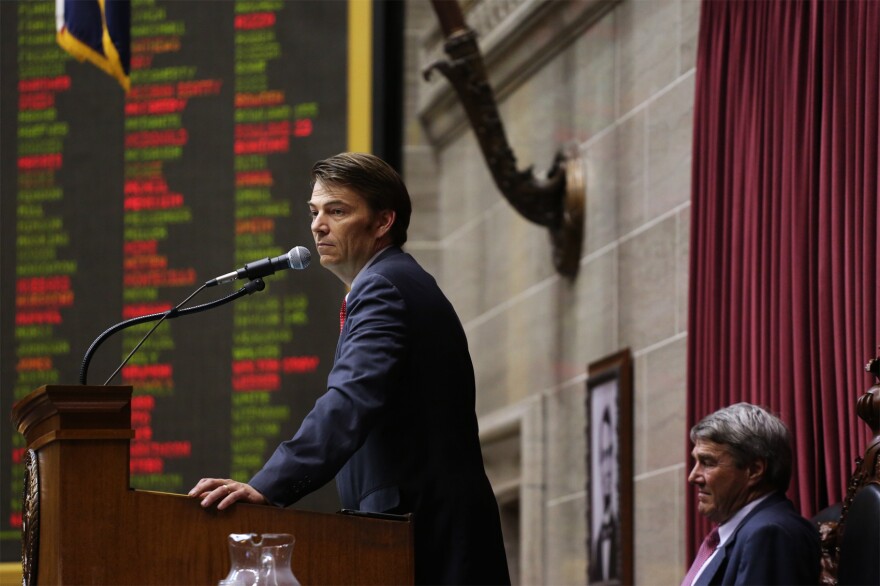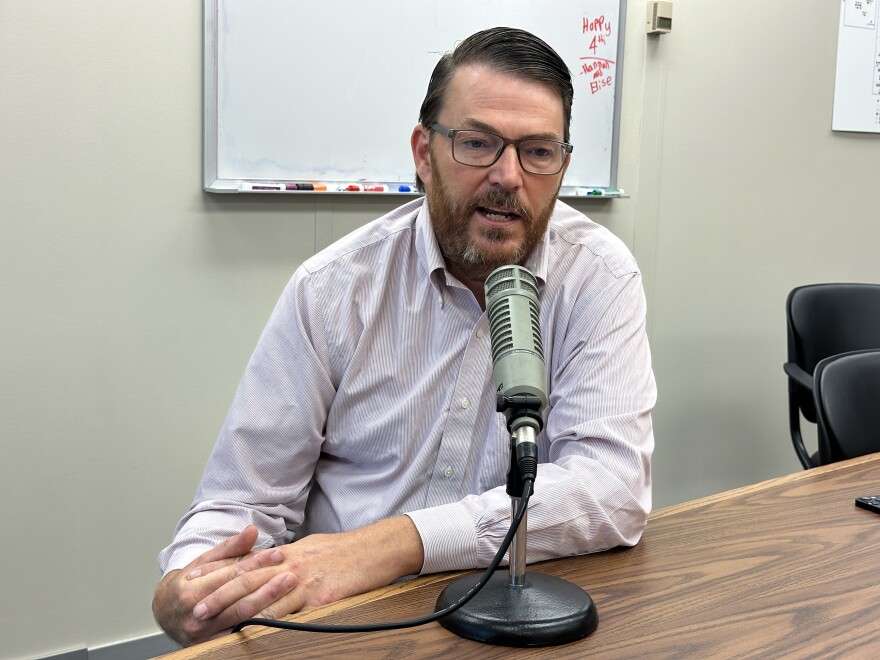Todd Richardson is no stranger to tough challenges.
When he was a member of the Missouri House, Richardson abruptly became speaker after his predecessor resigned amid a scandal. During his final year in elective office in 2018, he played an integral role in the months-long saga over then-Gov. Eric Greitens' future in office.
And the difficulties didn't cease when Richardson became Missouri's Medicaid director in 2018: He dealt with a once-in-a-generation pandemic and the implementation of voter-approved Medicaid expansion. Thanks to Congress, he'll have to shepherd through work requirements — and, potentially, deal with the sharp restriction of a critical tax that funds the program.
But in a wide-ranging interview with St. Louis Public Radio, Richardson said he doesn't shy away from difficult challenges or obstacles. In fact, he said Medicaid's complexity was one of the reasons he wanted to be in charge of Missouri's health care program for the poor, elderly and disabled.
"One of the things that made me really interested in this job was I like trying to solve big, complex public policy challenges," Richardson said. "And we're fortunate to have a team at Medicaid, and I think this is true in the broader Department of Social Services as well, where our team members like trying to solve those problems. We don't run away from them. We'd like to try to solve them and make them better."

A big safety net
As Richardson explained, Medicaid is a state-federal partnership that effectively works much like health insurance.
"When a doctor in Missouri sees a Missouri Medicaid participant, they're going to submit a bill for that, and we're going to pay that bill," Richardson said. "So all those dollars associated with the program are going not to the participants, but going to the medical providers — whether that be a doctor or hospital or pharmacy — for the services that they're providing."
There are four broad categories of Medicaid recipients:
- Low-income workers are eligible up to 138 percent of the federal poverty level, which is about $15,600 for a single person.
- Elderly individuals who live in long-term care facilities.
- People who are disabled.
- Children who are enrolled in what's known as the Children's Health Insurance Program. The parents of these enrollees can earn up to 300% of the federal poverty level, but the more someone earns the more that person has to pay in a premium.
In 2021, the Missouri Supreme Court ruled that the state had to accept Medicaid expansion enrollees. That's the program under the Affordable Care Act that covers up to 138 percent of the federal poverty level. The federal government pays 90 percent of the cost for those participants, while the state pays 10 percent.
Richardson said roughly 300,000 people have been added to the Medicaid program since expansion began in earnest. He also said the state hasn't had to spend general revenue on that program yet, thanks to the influx of funding from the American Rescue Plan.
He said he expects that money to dry up during the 2027 fiscal year, which runs from the middle of 2026 through the middle of 2027.
"It's pushed off the need to use general revenue to fund the expansion portion," Richardson said. "But once those funds are exhausted, it's going to be a cost. And so, we're obviously going to work with our partners in the General Assembly to make sure that it doesn't have the kind of negative impact on the budget that some people fear."
It's not clear exactly how much Medicaid expansion will cost the state in general revenue when the American Rescue Plan funds are spent. But Richardson said since about $3.5 billion is being spent on the expansion program, the state's portion of that tally would be around $350 million.
He added that the state could have been placed in a perilous financial situation if Congress adopted Florida Sen. Rick Scott's measure that would have done away with the enhanced federal match for new Medicaid expansion enrollees after 2031.
"Our Medicaid expansion benefits in the Constitution specify what level of benefits are included with the expansion population," Richardson said. "So it would have been very difficult for the state to weather a change that would have been a significant decrease in the level of federal support for the program."

Work requirements loom
While the recently enacted One Big Beautiful Bill makes multiple changes to Medicaid, the two biggest ones are the implementation of a work requirement and restrictions on medical provider taxes that help the state pay for Medicaid.
Barring a federal waiver, Missouri will have until the end of 2026 to set up their work requirement system. Although details are still in flux, Medicaid enrollees will either have to work, be in school, or perform community service in order to have access to the program.
Richardson said the state's goal is to make complying with these guidelines as easy as possible. That could include uploading documents to an online portal – such as SteadyIQ.
"Our goal is to make sure that people who are eligible and entitled to be on the program have the easiest path to get access to those benefits, while at the same time ensuring that those who are not eligible for the program are not on the program," he said.
And Richardson even said it could be possible for people to comply with the requirements without having to do anything.
"If they're working and we can verify that they're working through income data, then that's a verification right there," Richardson said. "Now, there are other exceptions to the work requirements that probably will require a participant to send some documentation or to involve a human. But I think there's a lot of that income verification that can be done electronically."
Others, though, are less optimistic that work requirements will be intuitive for enrollees.
Heidi Lucas of the Missouri Rural Health Association used to work as a caseworker signing people up for Temporary Assistance for Needy Families. And she said that complying with these requirements were often impossible, especially for people living in rural parts of the state with a finite amount of employment opportunities.
"What happens if they fall and break a leg?" Lucas asked. "Or they have a heart attack? The hospital in their area still has to provide them care, but they are no longer having insurance because they didn't meet the work requirements or because there weren't enough jobs to go around. So suddenly it's a snake eating its own tail."
But Richardson says the work requirements serve an important purpose: Making sure Medicaid is available for people who really need it.
"We want the program to be available for those who need it," he said. "Work requirements are a way to ensure that the population on the program is sustainable for the long term."
Medical provider tax restrictions
Under the One Big Beautiful Bill, medical provider taxes on places like hospitals will be capped at 3.5% by 2032. As of July of this year, Missouri's medical provider tax, which is known as the Federal Reimbursement Allowance, is at 5%.
Because the restrictions go into effect gradually, Richardson said that the One Big Beautiful Bill won't impact Missouri until 2030. That's when the state will have to drop its tax rate to 4.5%.
"While we're not unconcerned about that change, we're in a much better position to deal with that than we would have been if we still had our tax rate pegged out at the 6% cap, which is where we were just a few years ago," said Richardson, adding that the state is less reliant on medical provider taxes than it was in the past.
Missouri Sen. Josh Hawley introduced legislation earlier this month to prevent the medical provider tax curbs from going into effect. Hawley and the Missouri Hospital Association expressed grave concerns that the restrictions could hurt rural hospitals – especially since states may reduce payments to providers as a way to fill in the funding gap.
Richardson said, though, that he's excited that Congress included $50 billion to help rural hospitals, some of which will assist facilities in Missouri.
"We're very excited about that fund, and the ability to be able to provide some direct support for rural hospitals," said Richardson, adding that Gov. Mike Kehoe's administration will be submitting a plan for how that money can be used.
Whether Hawley's bill preventing the medical provider tax restriction from going into effect can be implemented is an open question. A number of Republican senators and officials within President Donald Trump's administration expressed hostility to states using medical provider taxes.
Richardson said "there's a lot of time for us to figure out how to manage that if it goes into effect."
St. Louis Public Radio's Sarah Fentem contributed information to this article.
Copyright 2025 St. Louis Public Radio



